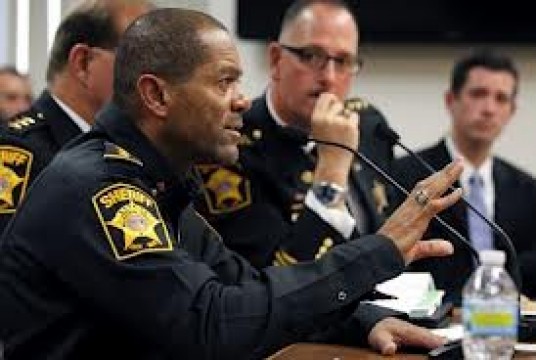PERSON: David Clarke
Employer
Milwaukee, Wisc.
Position
Sheriff
Biography
Milwaukee County Sheriff David A. Clarke Jr., is a lifelong resident of Milwaukee, Wisconsin. A graduate of Marquette University High School, he was a member of the varsity basketball team, which won the state private school championship in 1973.<br>
<br>
A career, law enforcement professional, he served 24 distinguished years with the Milwaukee Police Department before being appointed Milwaukee County Sheriff by Governor Scott McCallum in March 2002. In November 2002, Clarke was elected to a four-year term as sheriff, earning 64% of the votes cast. Sheriff Clarke is now in his third term, having been re-elected in November 2006 and 2010, increasing his victory margins to 73% and 74%.<br>
<br>
Clarke joined the Milwaukee Police Department in 1978 at the age of 21, and acquired a broad range of experience. In eleven years as a Patrol Officer, he received meritorious citations for felony arrests. He was promoted to Detective in 1989, and after only nine months as a Detective, was selected for the Milwaukee Police Department's specialized Homicide Division. Clarke was part of a team, which investigated more than 400 homicides in a four-year span. The Department made arrests in more than 80 percent of homicides, well above the national average of 60 percent.<br>
<br>
Three years later, Clarke was promoted to Lieutenant of Detectives, and was assigned to the Criminal Investigation Bureau as Shift Commander of the Crimes Against Property Division, the Violent Crimes Unit, and again, the Homicide Division. In 1996, he was promoted to the Milwaukee Police Department command staff as Captain of Police, and soon became Commander of the department's First District. The First Police District is the city's downtown business and entertainment district, and Clarke made it his goal to provide a safe environment for patrons of the expanding arts, theatre, and nightlife. Milwaukee's downtown is one of the safest in the nation.<br>
<br>
In 1999, Clarke became Commanding Officer of the Intelligence Division of the Milwaukee Police Department. The Division was responsible for producing and sharing intelligence, and for providing dignitary protection in conjunction with the Secret Service, the Department of State, and other federal agencies. Clarke also served as the Department's liaison with the United States Attorney as coordinator of the CEASEFIRE violent crime reduction program, and with the Federal Bureau of Investigation, the Bureau of Alcohol, Tobacco and Firearms, Customs Service, Immigration and Naturalization Service, and the Wisconsin Department of Criminal Investigation.<br>
<br>
Clarke graduated summa cum laude from Concordia University Wisconsin with a degree in Criminal Justice Management. In May 2003, Concordia honored him with the Alumnus of the Year Award. Sheriff Clarke is a graduate of the FBI National Academy in Quantico, Virginia. This prestigious school trains law enforcement executives from all over the world, and provides management and leadership instruction. In July 2004, he completed the intensive three-week Program for Senior Executives in State and Local Government, at the John F. Kennedy School of Government, Harvard University, in Cambridge, Massachusetts. <br>
<br>
In October 2004, Sheriff Clarke participated in the 80-hour Executive Development Program of the National Sheriffs’ Institute, which was sponsored by the National Sheriffs’ Association and the National Institute of Corrections in Colorado. Clarke returned to Harvard University’s John F. Kennedy School of Government in April 2005, and completed the week-long executive education program entitled, “Driving Government Performance: Leadership Strategies that Produce Results.”<br>
<br>
In 2005, Sheriff Clarke was nominated to attend the FBI’s 28th Annual National Executive Institute, a world-renowned leadership development forum for law enforcement executives, conducted by recognized experts in leadership; social, political and economic trends; media issues; ethics; international policies; intelligence-led policing, and homeland security. Held over three, one-week cycles in Quantico, Virginia; Ottawa, Canada and Gettysburg, Pennsylvania, the forum focused on important issues facing law enforcement in the United States and other nations.<br>
<br>
Sheriff Clarke traveled to Los Angeles in 2009, and met with Police Chief William Bratton and L.A. County Sheriff Lee Baca, and studied their operations. Of special concentration were LAPD’s CompStat system--a crime control and analysis model; and LASD’s detention services, large jail management, and emergency management operations.<br>
<br>
In October 2009, Sheriff Clarke was honored to receive the prestigious Americanism Award from the Milwaukee County War Memorial Veterans Board of Directors at their annual awards ceremony. The board, consisting of 22 veterans organizations, historically has given the award to civic leaders and community volunteers, and not to elected officials. However, board members said they chose to recognize Sheriff Clarke in “appreciation for his version of law and order.”<br>
<br>
Sheriff Clarke is a member of several professional organizations, including the National Organization of Black Law Enforcement Executives, the American Jail Association, the International Association of Chiefs of Police, the Major County Sheriffs’ Association, the Badger State Sheriff’s Association, and the National Sheriffs’ Association, for which he serves on the Legal Affairs Committee.<br>
<br>
He presently serves on the board of directors of the Milwaukee County Council Boy Scouts of America. He is a recent past member of the Board of Trustees of the Boys & Girls Clubs of Greater Milwaukee, the Milwaukee Tennis & Education Foundation, the American Red Cross in Southeastern Wisconsin, the Alma Center, and ArtWorks Milwaukee.<br>
<br>
Sheriff Clarke and his wife Julie, a realtor, live in the home they built on the northwest side of Milwaukee, and are parish members of the Cathedral of St. John the Evangelist. <br>
<br>
-- county.milwaukee.gov
ClipsBank
Full
Compact
NewsBase
Full
Compact
RadioBank
Full
Compact
PodBank
Full
Compact
TranscriptBank
Full
Compact
No data found








